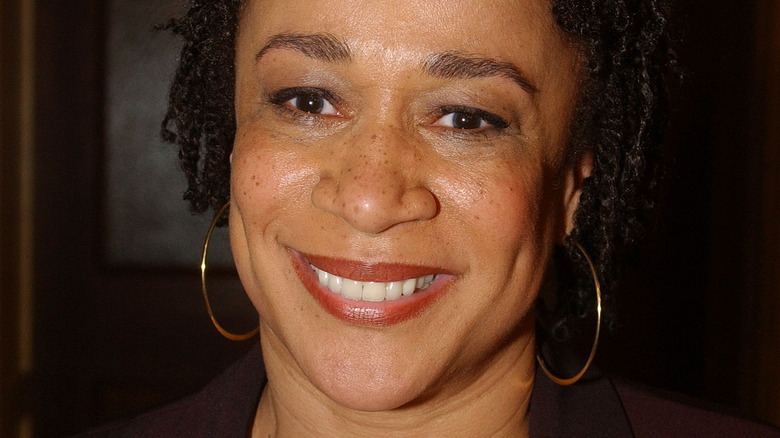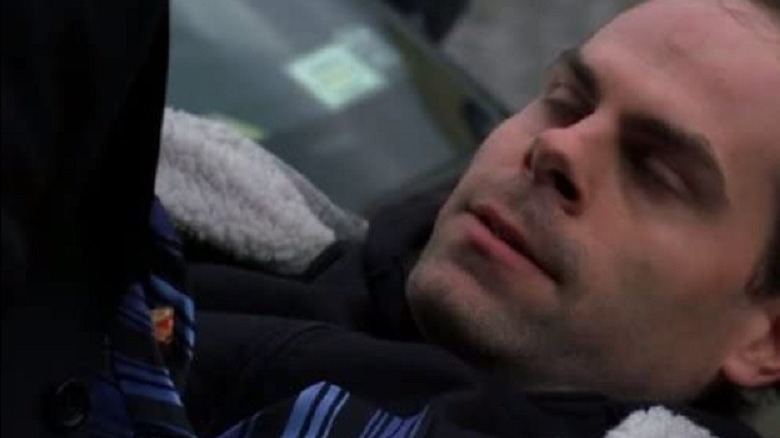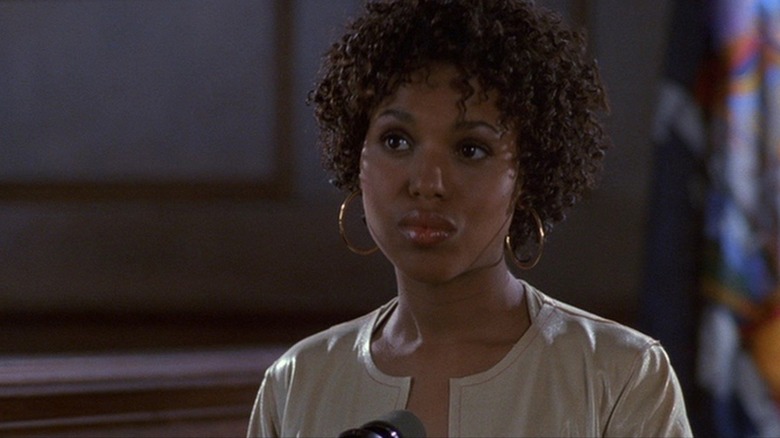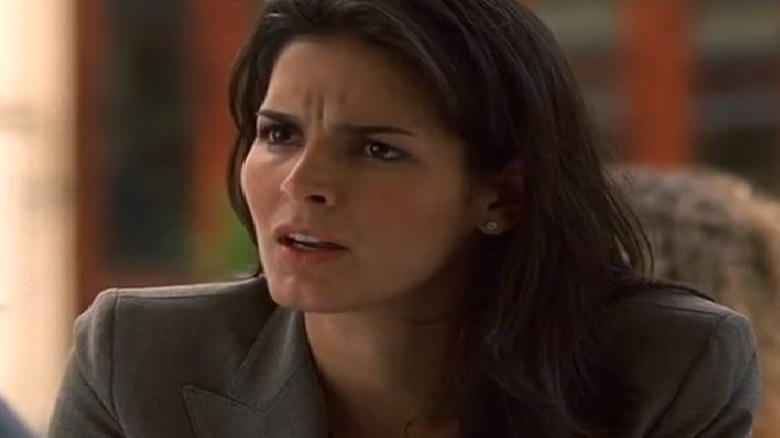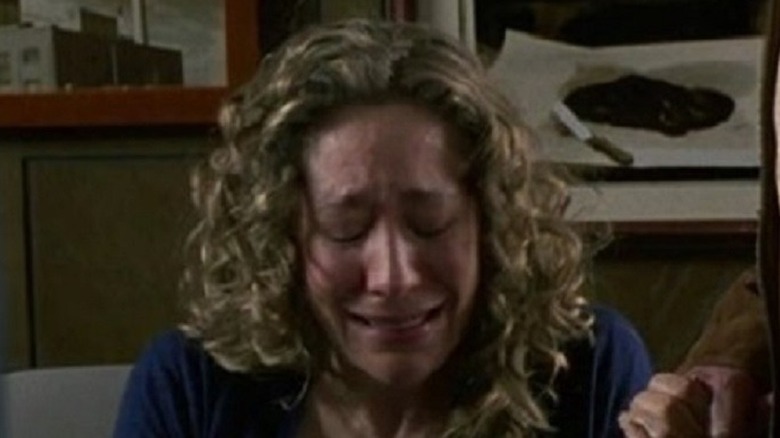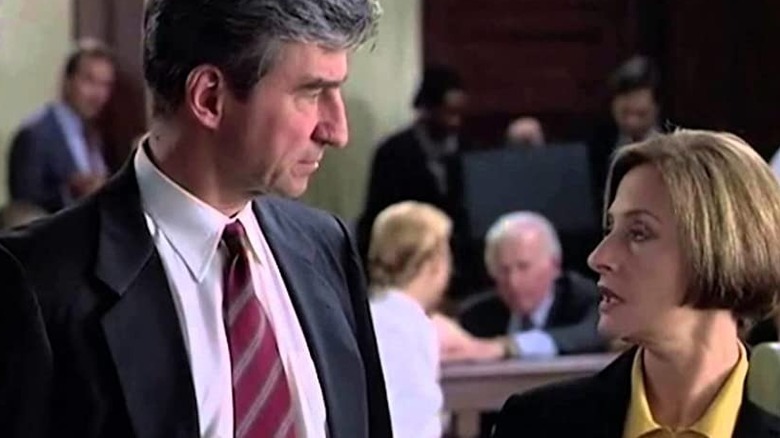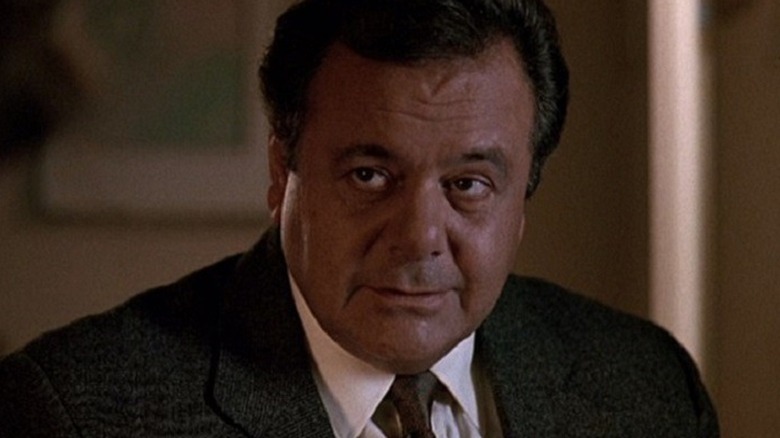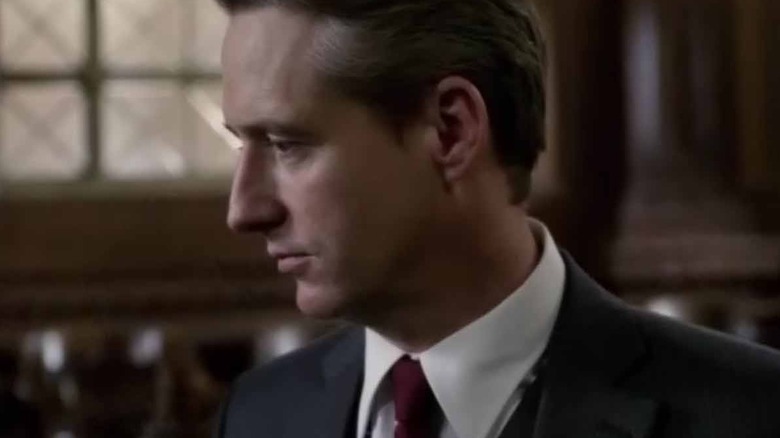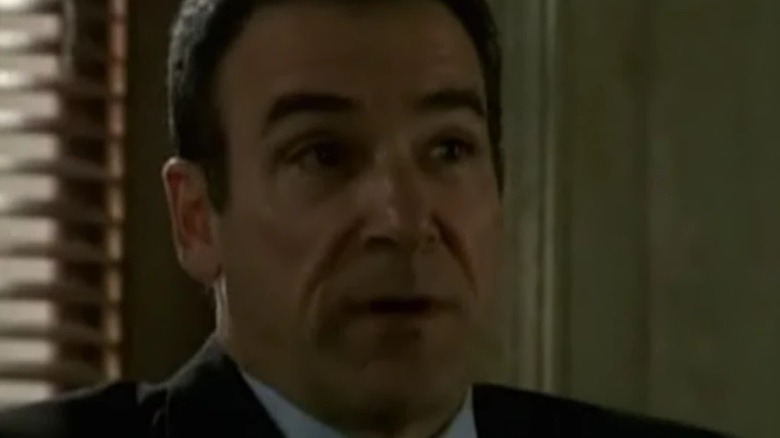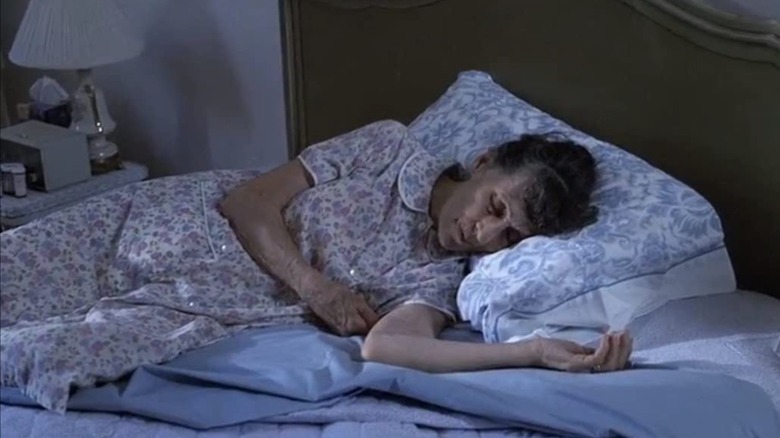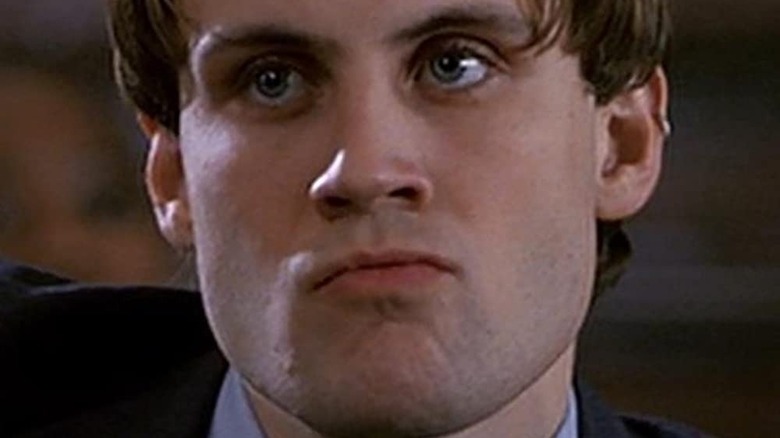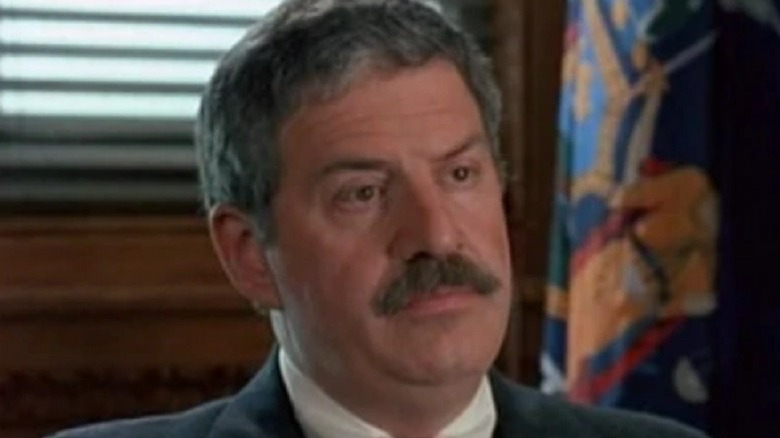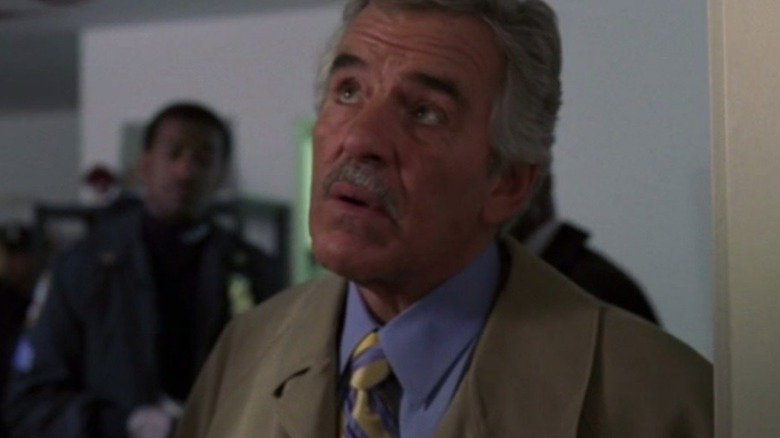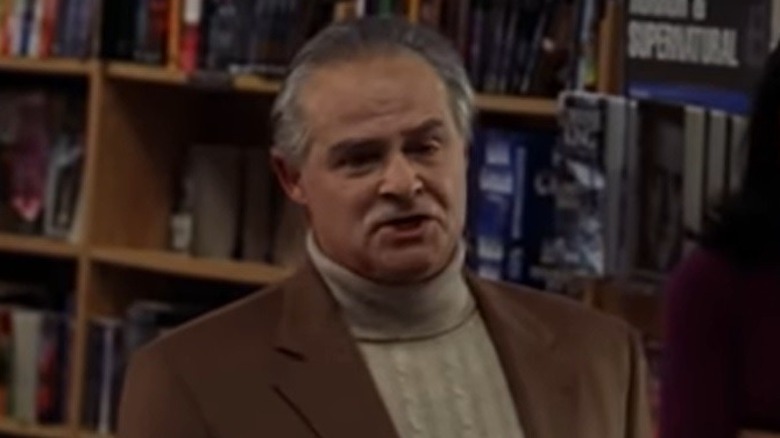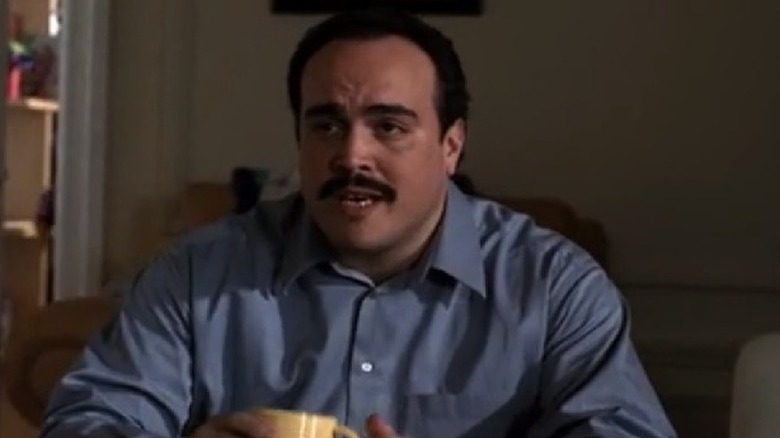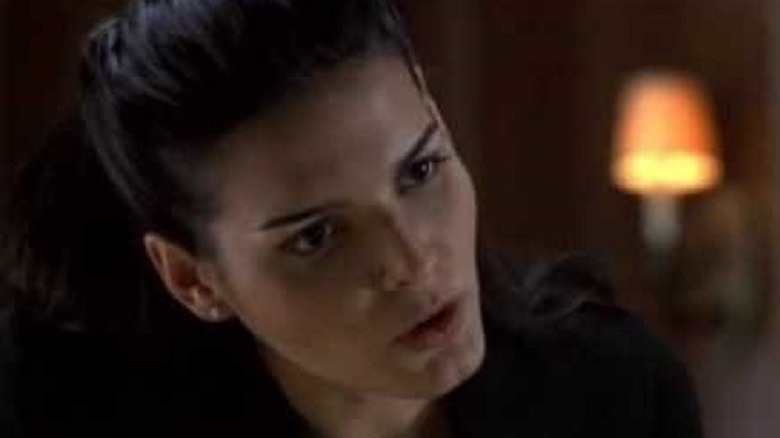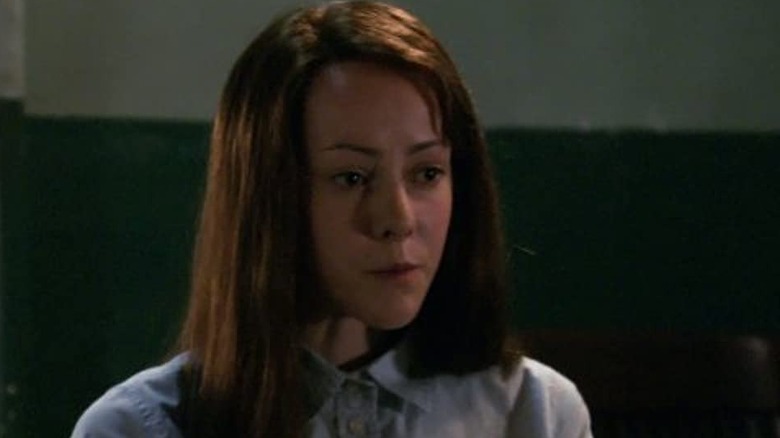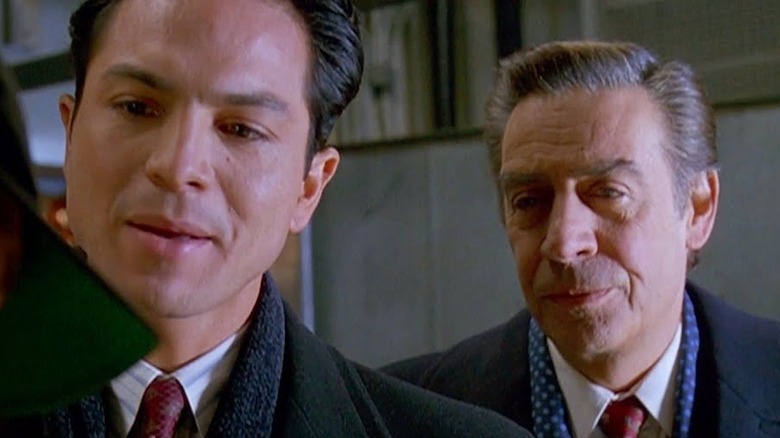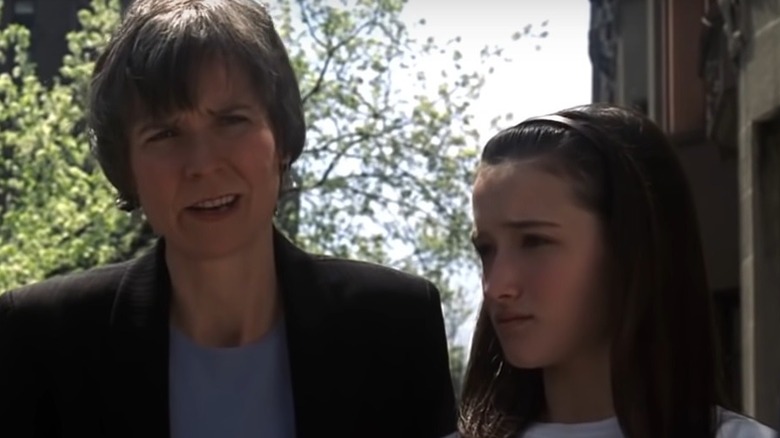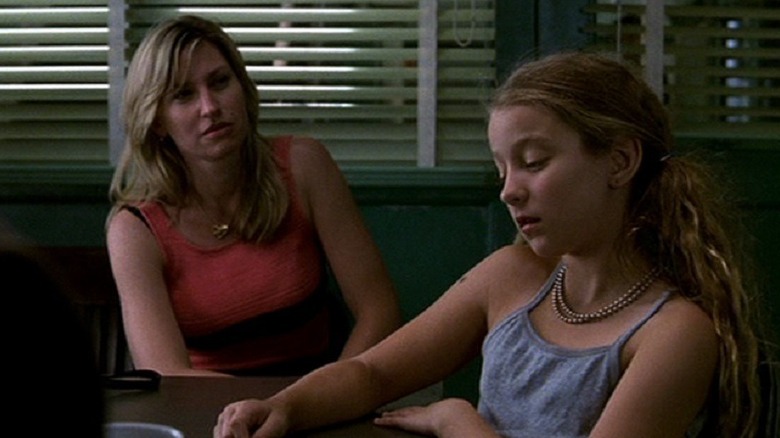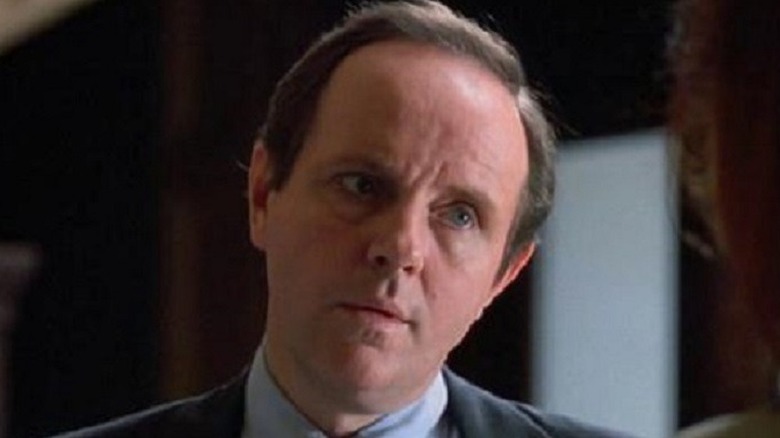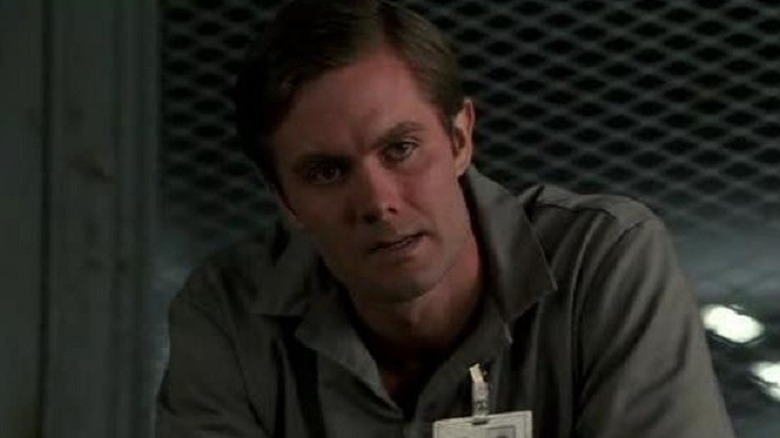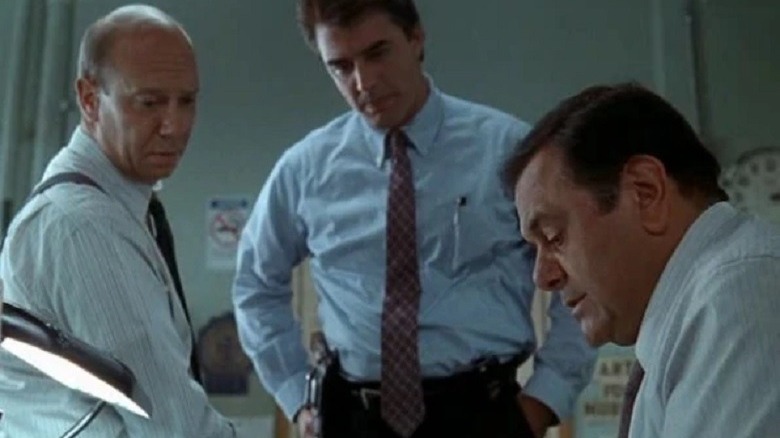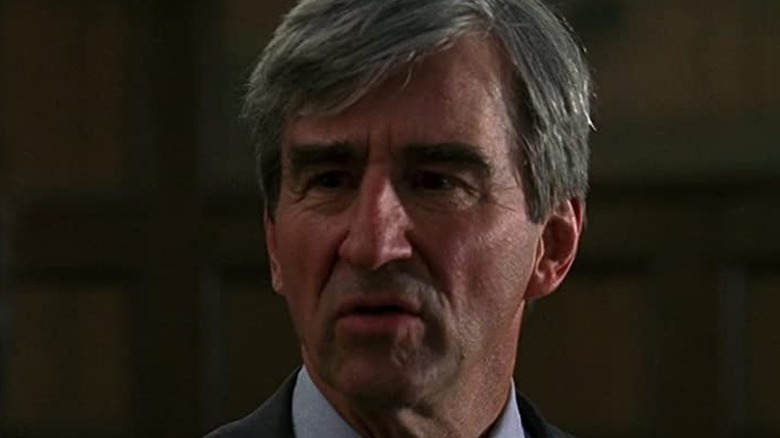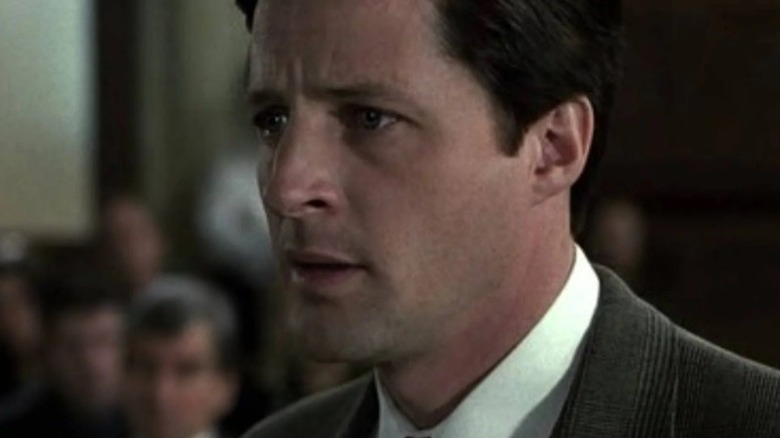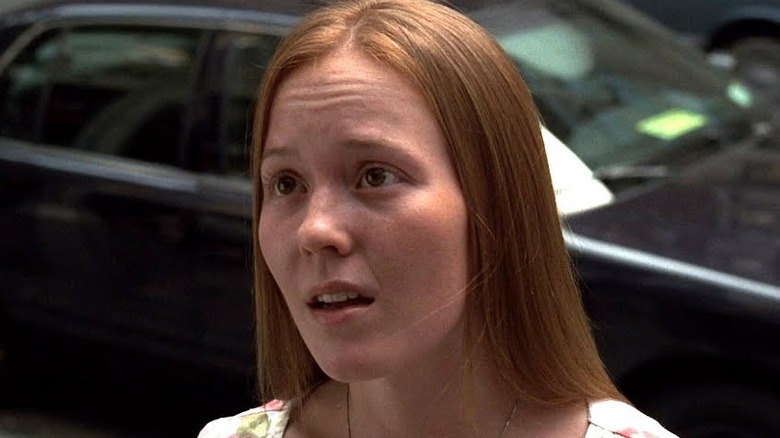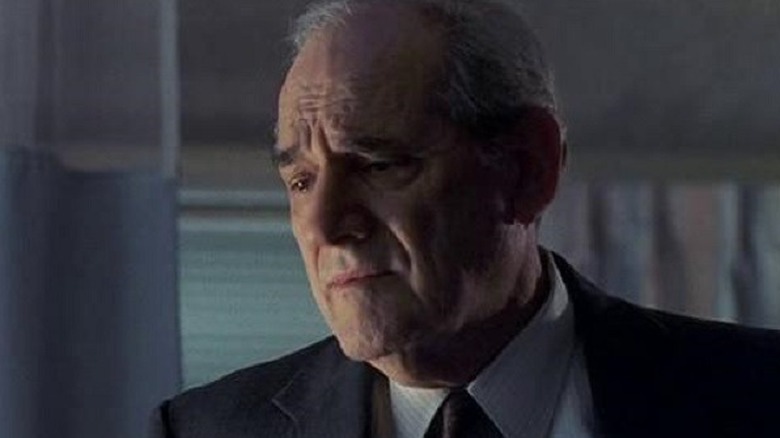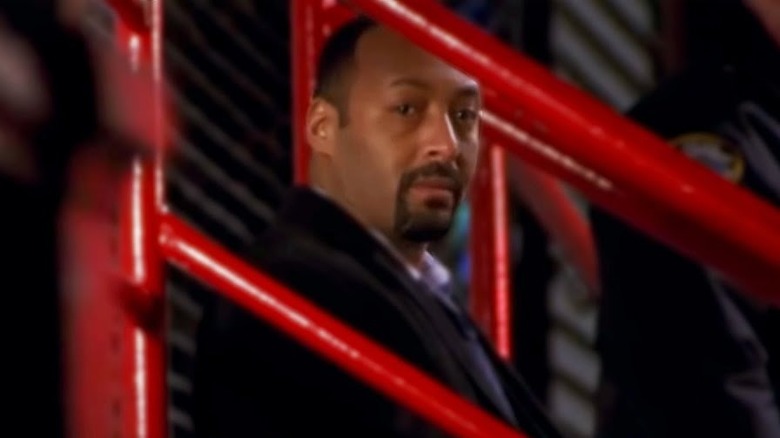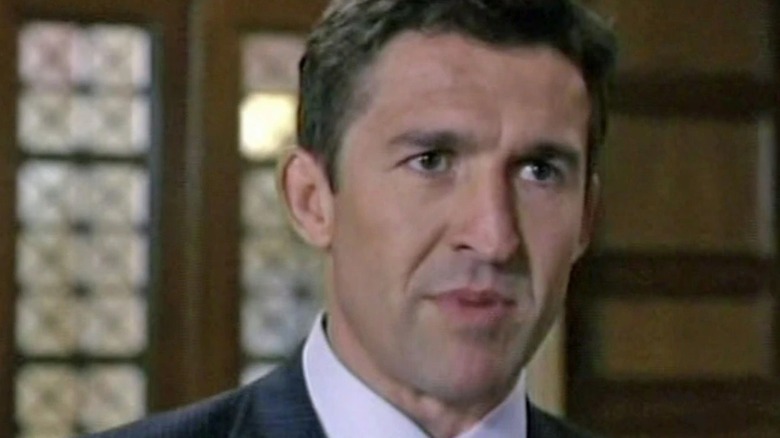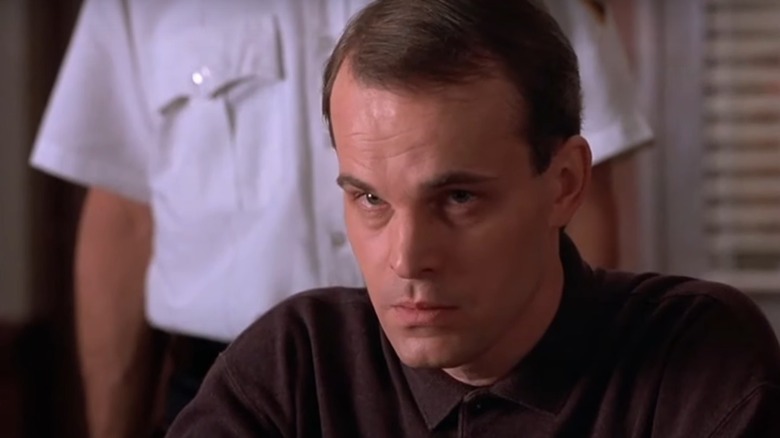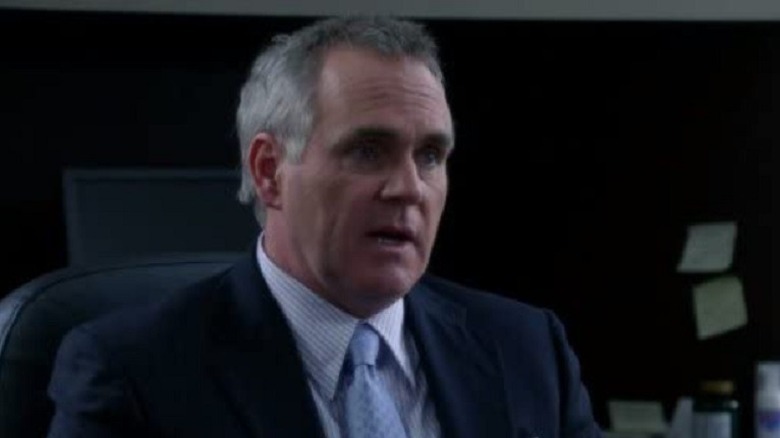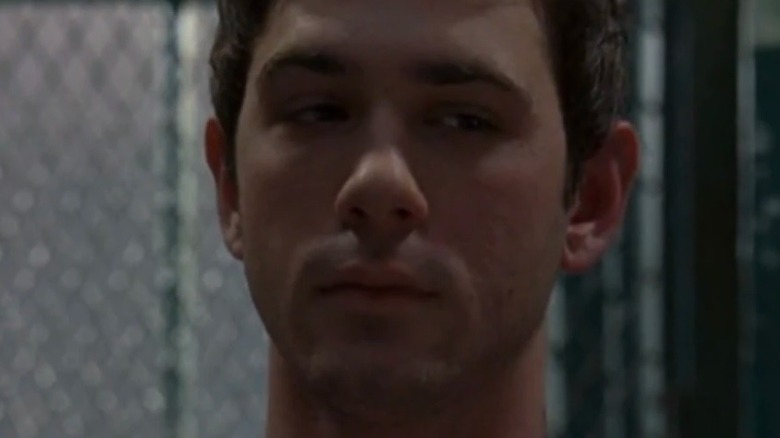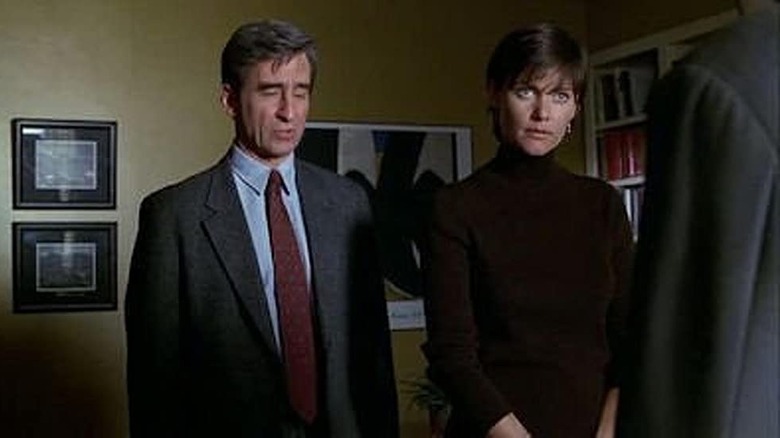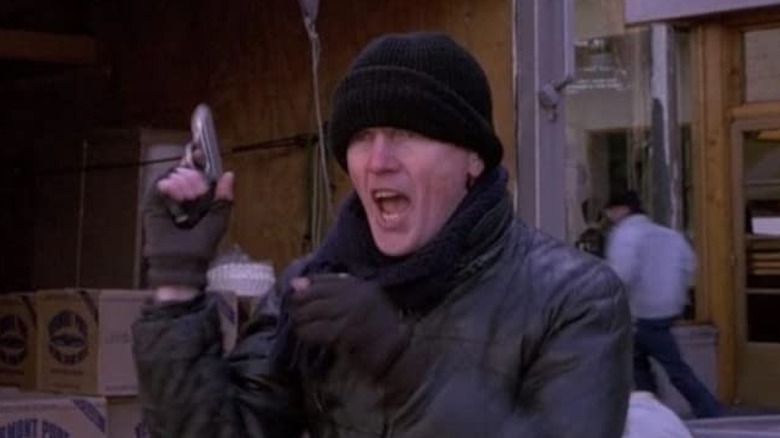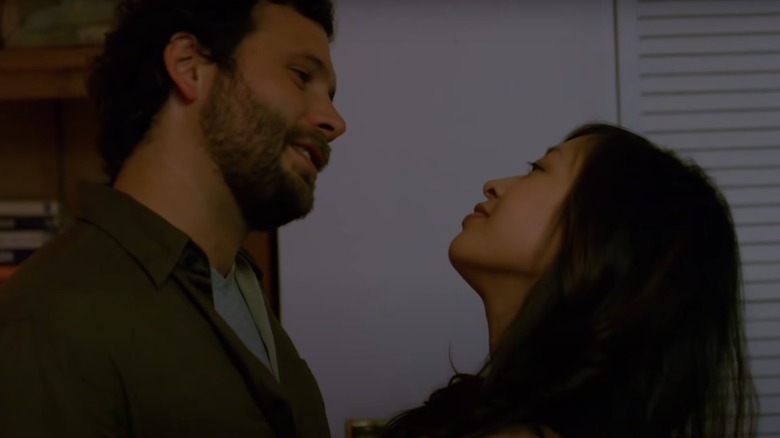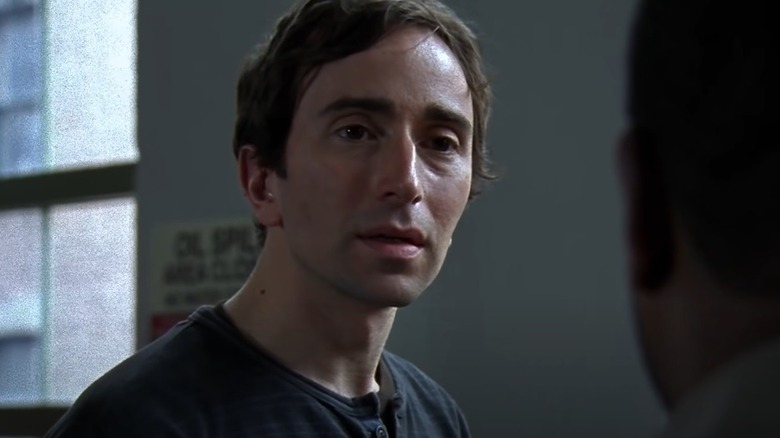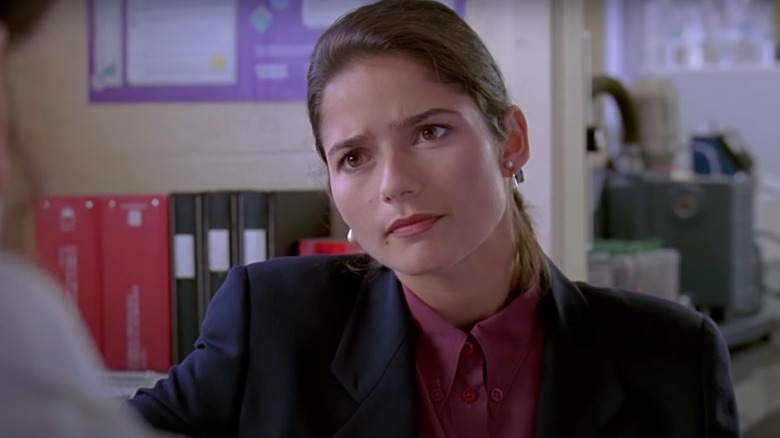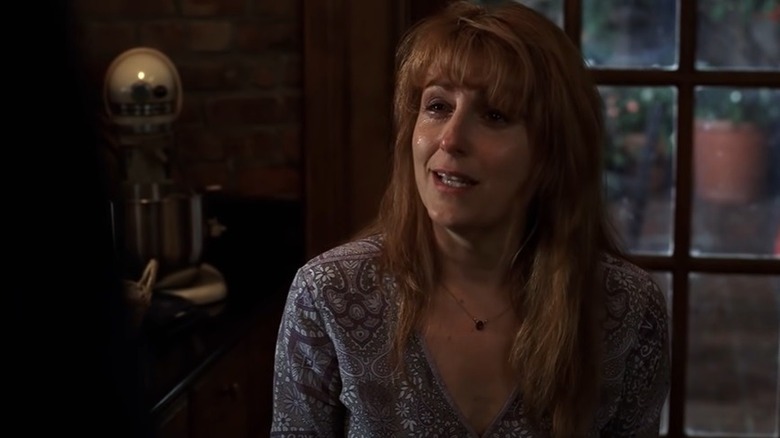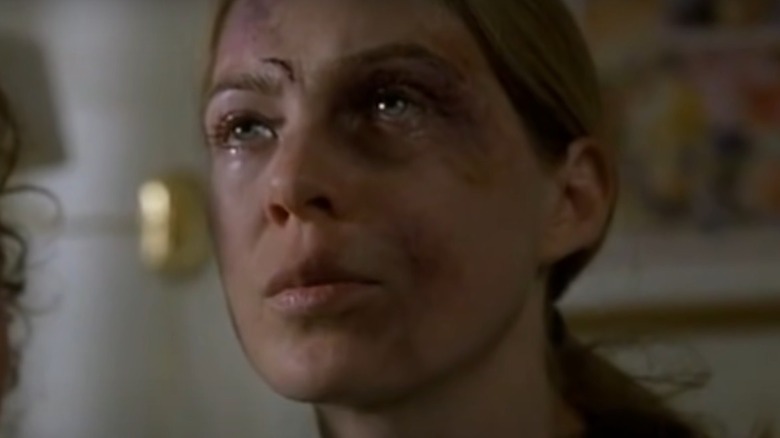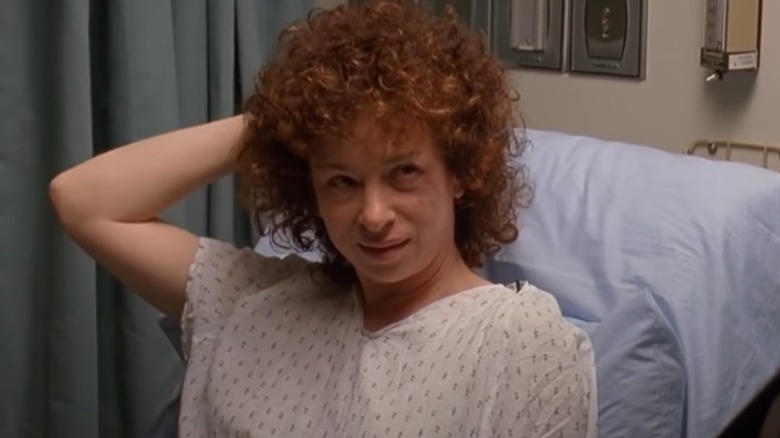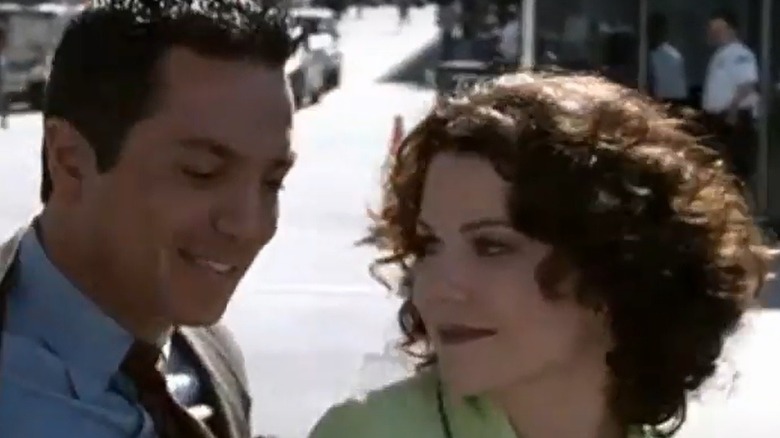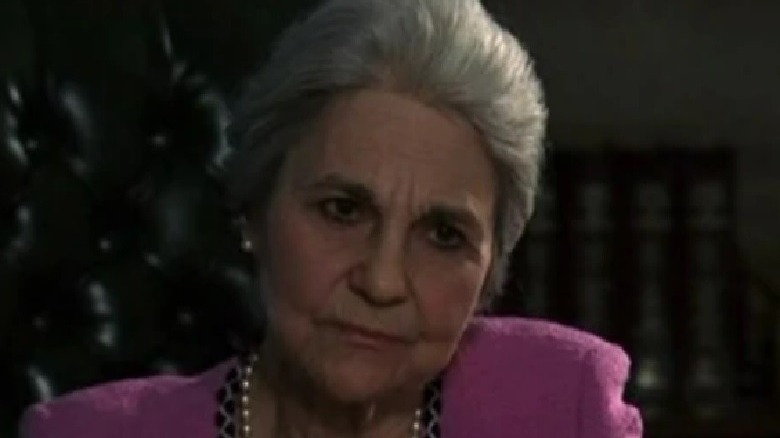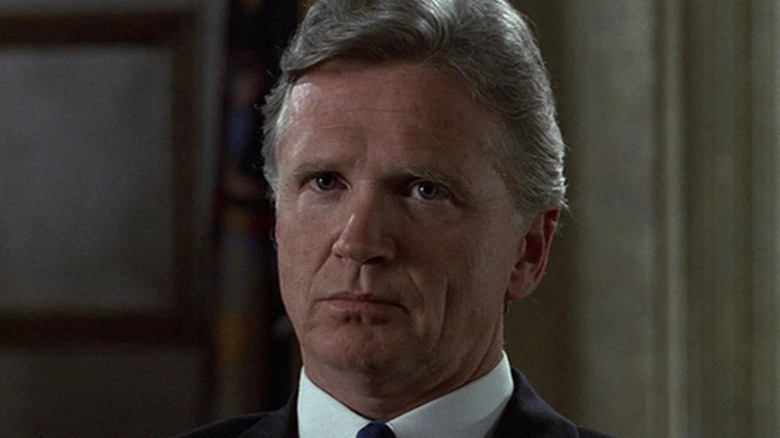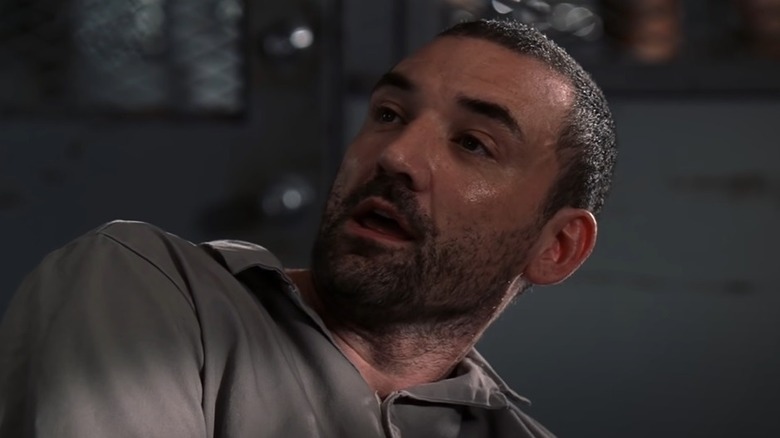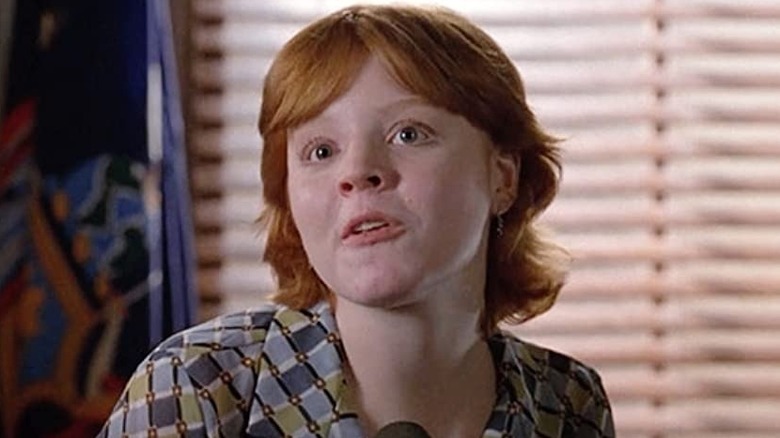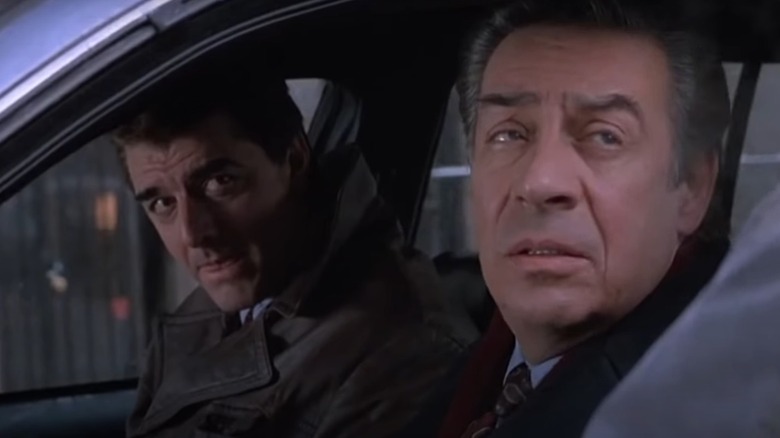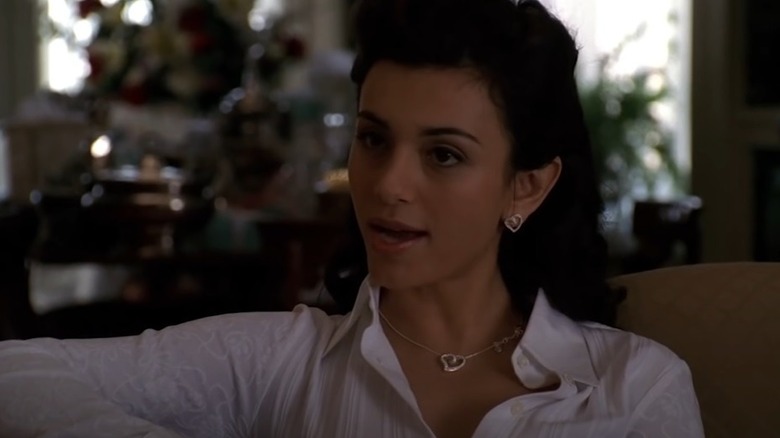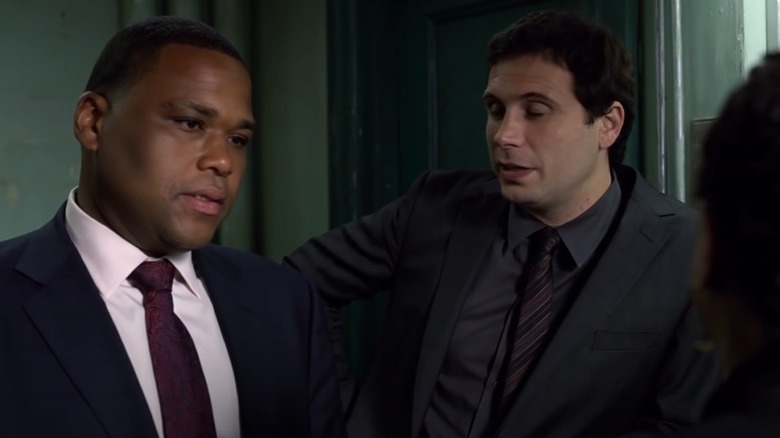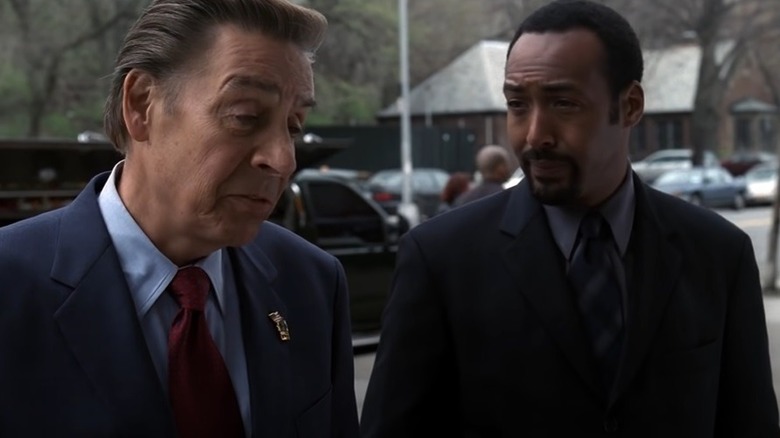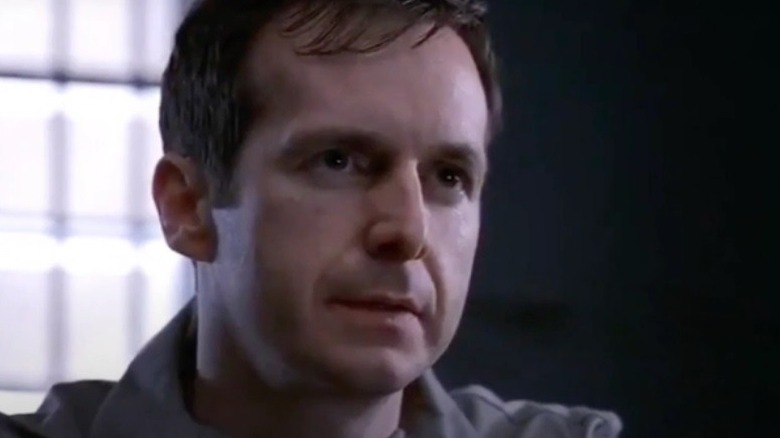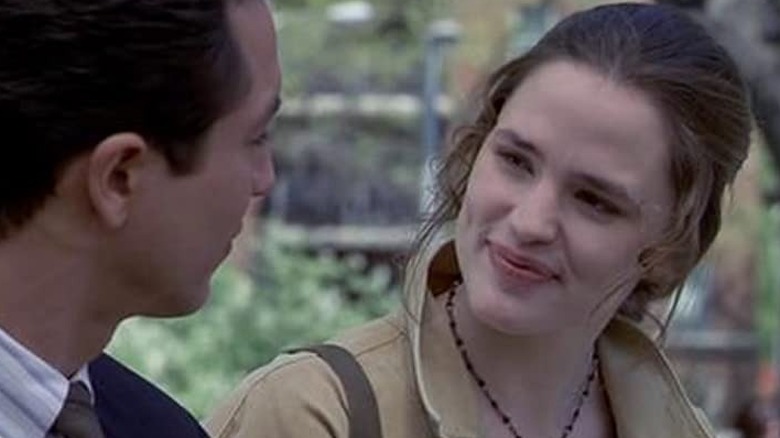50 Best Law And Order Episodes Ranked
The original "Law & Order" debuted in 1990 and ended its original run in 2010. That's an impressive stint for any show, let alone an hour-long police procedural/courtroom drama hybrid. During that time, it launched six different spin-offs with 38 combined seasons between them — the longest-running thus far being "Special Victims Unit." In February of 2022, after twelve years off the air, the original "Law & Order" series returned with a mostly new cast but led by returning regulars Sam Waterston and Anthony Anderson.
What the future holds for the "Law & Order" revival and whether it will recapture the magic of the original run remains to be seen, but there is definitely a lot for it to live up to. "Law & Order" is regularly hailed as one of the greatest TV shows of all time, and there are literally hundreds of hours of incredible television across its multi-decade run. Unlike many top 50 lists, where the lower entries are of somewhat questionable quality, the top 50 "Law & Order" episodes are all legitimately great pieces of television. A "worst to best" list of "Law & Order" episodes, this is not — think of it more like a list of "great to excellent" episodes.
50. Deadlock (Season 17, Episode 9)
"Law & Order" is never afraid to date itself, and "Deadlock" firmly puts it in 2006 with a debate about which of the two NFL superstar Manning brothers is the superior athlete. Little touches like this serve dual purposes, making the show feel current at the time of its airing while also effectively putting a timestamp on it when viewed later in reruns. And if there's one thing that we can all be sure of, it's that "Law & Order" reruns will run on a near-continuous loop for as long as basic cable exists (and will long be a coveted property for any streaming service).
Beyond the sports talk, "Deadlock" is about a mass murderer who escapes from prison, killing a guard in the process. He is eventually cornered in a school, where he ends up shooting several children in the standoff. A father of one of the children decides to take revenge on the felon himself, an act that a local politician uses as a campaign angle. The episode touches upon everything from the question of whether violent offenders can ever be truly reformed and the morality of vigilante justice to the shamelessness of politicians in exploiting horrible tragedies just to win elections.
49. 3 Dawg Night (Season 12, Episode 9)
"Law & Order" is one of those shows that every actors seems to have popped up on, particularly those living and working in New York. Watching reruns now, it seems that almost every episode features some then-unknown actor that has since gone on to be a household name. The 2001 episode "3 Dawg Night" has two examples: Kerry Washington and Idris Elba, both appearing on the show before becoming big stars.
Examining hip hop-related violence, "3 Dawg Night" links a famous rapper to a shooting at a nightclub. Elba plays the club's manager, who reveals that the venue relies on a guest list for security and therefore has never bothered with things like metal detectors. He also boasts that the club isn't typically associated with violence or drug use. It turns out that the shooter, who was not on the guest list, was let in by a bouncer who was an old acquaintance of his. The investigation is made difficult by the celebrity rapper's handlers restricting access to him, as well as the hundreds of potential witnesses who supposedly saw nothing. It comes down to one community's mistrust of law enforcement and a legal system that rarely seems to be on their side.
48. Merger (Season 10, Episode 4)
"Law & Order" often tackles plotlines that examine the rich and powerful, and the way that they frequently seem to stay out of the reach of the law. In the episode "Merger," the district attorneys have to deal with not one but two wealthy families doing everything within their considerable power to make proceedings as difficult as possible. The two families were on the path to being connected — merged, if you will — by marriage, but the boyfriend allegedly murdered the girlfriend.
Typically (at least in the "Law & Order" universe), a rich family has no problem getting justice when something is done to their own. At the same time, rich families are also often able to buy the freedom of one of their members when they run afoul of the law. But when two rich families are on opposite ends of the case, it leads to one huge legal mess for everyone involved. That this episode was written by Lynn Mamet, who has been nominated for two Emmy Awards for her work as a producer on "Law & Order," should come as no surprise given the expertly-crafted and explosive dialogue throughout.
47. Excalibur (Season 18, Episode 18)
It should go without saying that a lot of the best "Law & Order" episodes are season premieres and season finales. As a show that is almost entirely episodic in nature, it doesn't do the clichéd season finale cliffhanger thing that so many shows do. But that's not to say there isn't clearly an effort made to have each season start and end with a particularly good episode, and that is definitely the case with the one that wrapped up the show's 18th season.
At the time, star Sam Waterston seemed to initially confirm that the plot of "Excalibur" was based on the prostitution scandal surrounding New York governor Eliot Spitzer, but then backtracked and said it was just a generic story about a politician and a prostitute. "Law & Order" will often advertise an episode as "ripped from the headlines" but is understandably hesitant to say which headlines, even though it's usually obvious where the inspiration is coming from. Whether "Excalibur" was based on a specific story or not, it is a powerful episode that does an amazing job at addressing the conflicts that arise when members of a DA's office have to essentially go after their own boss.
46. Homesick (Season 6, Episode 22)
The gripping Season 6 episode "Homesick" is seemingly based on the shocking case of the Swiss au pair (typically known as a nanny in the U.S.) that was accused of starting a fire that killed the child she was looking after. It's the story of a nanny from Europe on trial for the death of a child in her care. In the "Law & Order" version, the au pair is British and accused of feeding the child poisonous plants.
"Law & Order" typically does a good job of having its fictional version of a real case be different enough that it's not a straight-up retelling, in part because it isn't very interesting to already know how a show is going to end. But in the case of "Homesick," the writers really outdid themselves in coming up with a final surprise reveal that was an absolute gut punch of a twist — so much so that we won't spoil it in case you haven't seen it yet (and you should).
45. Point of View (Season 3, Episode 9)
Actor Jerry Orbach is so closely associated with the first decade and a half of "Law & Order," informing so much of the show's tone during its police procedural days, that it's easy to forget he wasn't there from the first episode. In fact, he wasn't even there from the first season, not joining the cast until the ninth episode of Season 3. But the debut of Lennie Briscoe isn't the only reason that "Point of View" is such a key episode — it also marks the final appearance of another character.
Phil Cerreta (Paul Sorvino) had been Mike Logan's (Chris Noth) partner up to this point, but suffers serious injuries after being shot during an undercover operation gone sour in the previous episode. He makes the call himself to settle into desk work, realizing he will never be 100% again. It's a performance that really showcase's Sorvino's remarkable talents. In addition, beyond Cerreta passing the torch to Briscoe, the actual case at the center of "Point of View" deals with a mob shooting that brings in the wonderful Elaine Stritch to guest star as an attorney in a performance that would later nab her an Emmy. It's not easy for one episode of a TV series to balance all of that, but "Point of View" handles it all flawlessly.
44. Innocence (Season 20, Episode 16)
Even though just about every "Law & Order" episode focuses on a single crime, the investigation of that crime, and then the hearing for that crime, there are often other things going on. Sometimes, those other things feel like the focal point of the episode and the police and courtroom stuff feels secondary. Such is the case with the episode "Innocence," in which the crime feels like the B plot in a lot of ways.
The crime at the center of "Innocence" is unique in that it doesn't kick off the episode — instead, we join an investigation already in progress. But again, all of that feels somewhat secondary to the core of the episode, which is that Jack McCoy's ongoing ambivalence about Executive Assistant DA Michael Cutter (Linus Roache) comes to a head when it is revealed that Cutter has been dishonest about his credentials and education history. These "Law & Order" episodes where we get a deep dive into a specific character are always interesting, and though he didn't join the cast until the final few seasons, "Innocence" did a great job of fleshing out Cutter and justifying his addition to the show so late in the game.
43. Absentia (Season 13, Episode 13)
Actor Mandy Patinkin made the rounds in law and hospital shows in the '90s and '00s, with stints on both "Chicago Hope" and "Criminal Minds." However, he only showed up in the entire "Law & Order" universe once, during a single episode of the original show's thirteenth season. In "Absentia," Patinkin plays Glenn, the witness of a jewelry store robbery who ends up disappearing before his turn comes to testify. It is then revealed that Patinkin's character was originally known by a completely different name — and in the life attached to that name, he was on the run for a murder he'd already been convicted of.
It probably shouldn't have been a surprise that Patinkin ended up doing way more than witnessing a crime. He has a much bigger role in the episode, in which his lawyer is played by the highly underrated Andrew McCarthy in the second of his three different "Law & Order" universe roles. With the argument being that the original murder conviction was unconstitutional, the episode examines the complicated nature of whether a correct verdict should be upheld when that verdict was reached in a legally flawed manner.
42. Gunshow (Season 10, Episode 1)
"Law & Order" goes big with its premieres and finales, and Season 10 saw one of the strongest starts in the history of the series. "Gunshow" kicked off the tenth season with a you-know-what, as a man goes on a shooting spree in Central Park that results in the deaths of five people. Airing a mere five months after the tragedy at Columbine high school, mass shootings were on the nation's mind in a big way. This episode wasn't based on that (or school shootings in general), but it was definitely picking at a wound that was still very raw.
Rather than take the obvious angle of having the episode be about prosecuting the shooter, Jack McCoy instead decides to go after the manufacturer of the shooter's gun. It turns out that the gun was too easy to convert to a fully automatic weapon and lacked the necessary restrictions to prevent that, leading McCoy to decide that there's grounds to bring murder charges against the company. It was a risky storyline for the time, but one of the things that makes "Law & Order" great is that it's never been afraid to take a strong stance on a hot-button issue.
41. Teenage Wasteland (Season 11, Episode 12)
Assistant DA Abbie Carmichael was one of the most no-nonsense, eyes-on-the-prize prosecutors on the show. Played by the wonderful Angie Harmon, Carmichael never hesitated to ruffle feathers in her pursuit of what she thought was right, and it would often put her at odds with her fellow prosecutors — something that never bothered her in the slightest. Sometimes her aims could be classified as extreme, but there was never any doubt that she was doing what she believed with her whole heart to be the "right" thing.
One of the episodes that best showcases Carmichael's tenacity is "Teenage Wasteland," where a teenager is on trial for the brutal murder of a delivery driver all in the name of an adrenaline rush. Being 18 years old, there is some question as to whether the defendant should be tried as a juvenile or an adult. But it's an easy choice for Carmichael, who fully pushes for an adult trial for the accused even though (or perhaps because) it would mean death row if he is convicted. Not only does the episode provide an amazing showcase for Carmichael as a character and Harmon as an actor, but it is a very hard look at what to do when the person behind a violent crime is in that gray area between teenager and adult.
40. Helpless (Season 3, Episode 6)
When a gynecologist is accused of molesting his patients, it initially seems like an open and shut case. But as it often goes with powerful men in police procedurals, the judge throws out the guilty verdict on various technicalities. In an attempt to gather more evidence, the woman who accused him — recurring character Elizabeth Olivet (Carolyn McCormick), the resident psychologist — goes back to his office and tries to get him to confess to the crime on a stashed tape recorder. Instead, he proceeds to sexually assault her.
Though initially continuing to be smug about any attempt to bring him down due to his respected standing in the community, over 50 women are eventually gathered who are willing to go on the record about being abused by him. It is only then that the charges finally stick and he is successfully prosecuted. Airing way back in the third season of "Law & Order" in 1992, "Helpless" was way ahead of its time and has remained sadly relevant in the years since.
If you or anyone you know has been a victim of sexual assault, help is available. Visit the Rape, Abuse & Incest National Network website or contact RAINN's National Helpline at 1-800-656-HOPE (4673).
39. Acid (Season 16, Episode 10)
A girl is driven to suicide as a result of the pain and anguish she suffered from having her face burned with the acidic drain cleaner which was deliberately thrown on her. The girl turns out to have a connection to Lieutenant Anita Van Buren (S. Epatha Merkerson), being the daughter of a longtime friend. While Van Buren hopes this will mean swifter justice for the girl, that doesn't end up being the case, as her friend has another daughter and she fears that the man will retaliate against her if she testifies against him. And considering how much he has gotten away with thus far, and that he continues to walk free (and be openly cocky about that fact), her fears are far from unfounded.
After a series of events finally gets the man on trial and behind bars, Van Buren's personal connection to the case almost gets the better of her and she very nearly commits perjury in order to help ensure that the man doesn't get off. It's a big moment for Van Buren, one of the show's staunchest moral compasses. This episode gets to the heart of what it means to be too close to a case. Van Buren finds herself wanting to bend the rules so the man gets what he deserves, and Merkerson's performance is compelling.
If you or anyone you know is having suicidal thoughts, please call the National Suicide Prevention Lifeline at 1-800-273-TALK (8255).
38. Obsession (Season 15, Episode 15)
The opinionated conservative talk show host whose murder sets off the events of the episode "Obsession" could be based on any number of real pundits. But this is a work of fiction — in the show, the pundit is shot to death, and the primary suspect is a woman who had recently taken him to court for sexual harassment. The case takes an unexpected turn when the investigation instead points toward a woman who had not only been stalking him, but is also the supposed lover of his wife.
Jack McCoy comes to believe that the wife convinced her lover to kill her husband. Why would she do that? Because she wanted to have his fortune all to herself, of course. Like so many "Law & Order" mysteries, money is at the root of it all. It's a fascinating episode with several twists that could've easily devolved into cheesy soap opera territory, but it speaks to the talent of the "Law & Order" writers that it's all handled so well and never gets too seedy or cringeworthy.
37. Smoke (Season 13, Episode 24)
The "Law & Order" universe has taken inspiration from Michael Jackson for characters and plotlines several times over the years. The "Special Victims Unit" episode "Sick" is the most blatant one, in that it involves a rich man that had children spend the night at his house. But the Season 13 episode "Smoke" definitely has enough similarities that it's hard to argue for it being coincidental, especially given the proximity of its airing to certain events in Jackson's life.
While the eccentric celebrity in 2003's "Smoke" is a comedian rather than a pop singer, he dangles his child from a balcony as Jackson infamously did with his own child the previous year. Only, in this case, the child not only falls, but dies. This sets the legal proceedings of the episode in motion. While the comedian was supposedly trying to save his kid from a fire rather than just doing it to show the boy off to his fans, it was very reminiscent of the scary real life moment. Similarities aside, "Smoke" is an enthralling episode that requires no knowledge of pop culture to enjoy.
36. Hate (Season 9, Episode 10)
It would be dishonest to have a show about the law enforcement and court systems that doesn't frequently involve racism, and "Law & Order" certainly came back around to that topic often. In the 1999 episode "Hate" — not to be confused with the 2004 "Special Victims Unit" episode of the same title, also dealing with racism — a group of young white supremacists are the primary suspects for the violent death of a teenage girl. Not only does Jack McCoy go after the group itself, but he also tries to include the adult leader of the group in the murder charge, arguing that he influenced them to commit the act.
As if all of that wasn't enough for one episode, there is also a fulfilling bit of personal B plot for Lennie Briscoe. The murder of his daughter the previous season obviously had a huge impact on him as a character, and during this episode it is discovered that her murderer had died of a drug overdose. Briscoe can't help but feel relieved by this development, providing him a bit of closure that he had yet to achieve.
35. Lost Boys (Season 19, Episode 3)
It's actually somewhat surprising that "Law & Order" didn't address religious cults before Season 19's "Lost Boys." This episode, which is about the investigation of a teenage boy's murder, takes detectives to a small New York village that is home to a cult led by supposed prophet Wyatt Landon (Colm Meaney). It doesn't take much digging to uncover that child brides and various forms of abuse are prevalent within the cult, and that Landon is exactly as dark and manipulative as we expected him to be.
Jena Malone puts in a powerful performance as one of the young brides who is trying to get away from the cult and its leader. As is often the case when dealing with a religion and their practices, questions of religious freedom and the jurisdiction of police in such matters play heavily into the episode. Such situations are always messy in real life, and that messiness is portrayed very well here. The authorities are frustrated, but it's a satisfying experience for the viewers.
34. Under the Influence (Season 8, Episode 11)
With so many charismatic attorneys on "Law & Order" at any given time, there are bound to be those that don't get as much attention or fan love. Such was the case with Jamie Ross, who, despite being played brilliantly by actor Carey Lowell, rarely got time in the spotlight. One of the rare examples of this was the episode "Under the Influence," which saw her hold her own against Jack McCoy as they butted heads over the handling of a drunk driving murder case.
McCoy's stance on the subject is clearly colored by having lost colleague and lover Claire Kincaid in a drunk driving accident two years earlier, during a stunner of an episode that will most certainly be addressed later in this list. The judge presiding over the case makes everything even more complicated when he decides he is going to make an example of the driver to help his chances in an upcoming election.
33. C.O.D. (Season 14, Episode 24)
Though he kept it private until shortly before his death, Jerry Orbach had actually been living with prostate cancer for most of his time on "Law & Order." The plan was for him to move over to spin-off "Trial By Jury" in a reduced role to accommodate his health issues, but he filmed only two episodes before he died in December of 2004. "C.O.D." would've already cemented itself as one of the great "Law & Order" episodes just by virtue of it being Lennie Briscoe's farewell, but they weren't about to let him end on a lesser case.
This is a story about a murdered delivery man and the subsequent questioning of his wife (and mistresses). Things get even more interesting when a similar case involving a dead husband, an angry wife, and the affairs that may have led to his murder pops up. Before long, authorities begin to suspect that the two wives might have planned their respective revenge plots together. The case that is brought is successful, giving Briscoe the chance to remark, "It's nice to go out on a win."
32. Killerz (Season 10, Episode 2)
If the "z" in the title "Killerz" didn't make it obvious enough, this episode aired in the early '00s and has kids at the center of the proceedings. Things start in very disturbing territory as the body of a young boy is found in a drain pipe. It gets worse when a 10-year-old girl becomes the primary suspect in his murder. In addition to the usual question of whether the girl should be tried as an adult, her mental health comes into play and Jack McCoy's recommendation is to have her committed to a psychiatric facility.
This is where the episode takes a unique turn and, rather than the second half being all about attorneys arguing with each other, it becomes a battle between psychologist Elizabeth Olivet and psychiatrist Emil Skoda. The two recurring characters — played by Carolyn McCormick and J.K. Simmons, respectively — were frequent fixtures on the show but rarely did they receive this much focus, and it's great to see people besides lawyers and judges get the chance to sling the show's trademark snappy dialogue back and forth at each other for a change.
31. Old Friends (Season 4, Episode 22)
Sam Waterston's Jack McCoy has become so closely associated with "Law & Order," which is reinforced by his return to the 2022 revival, that even OG fans would be forgiven for thinking he was there from the start. In fact, for the show's first four seasons, the show's main prosecutor was Ben Stone, played by Michael Moriarty. A bit more subtle and low-key than McCoy, Stone nonetheless did a great job carrying the legal half of the show during his tenure — up to and including his explosive final episode, "Old Friends."
In the episode, Stone proves his bravery and commitment to the job by going after the Russian mafia head-on after they are alleged to have been involved in the death of an accountant. The always excellent Allison Janney plays the star witness in the case, directly implicating the mafia in the accountant's murder. Unfortunately, as things often go when the mafia is threatened, several lives are ruined and Stone takes his role in that very personally. So much so, in fact, that he ends up resigning over the whole ordeal (thanks to Moriarty quitting the show), making room for Jack McCoy to take his place.
30. Open Season (Season 13, Episode 7)
Some "Law & Order" episodes begin with the ending of a trial, which typically clues viewers in to the fact that someone is about to be murdered as a result of the verdict. Sure enough, in "Open Season," the victim is the attorney of the defendant of that trial. Because the defendant was being charged with shooting a police officer, various cops become suspects in the murder, as well as members of an extremist group. When a member of that group is eventually brought to trial, recurring attorney Danielle Melnick finds herself having to represent a white supremacist.
Across Melnick's 13 episodes, actor Tovah Feldshuh plays her as one of the show's most entertaining foils for Jack McCoy, their relationship constantly whipping back and forth between affection and aggression. In a shocking turn of events, it is revealed that Melnick might have had a hand in another attorney on the victim's PDA contact list being murdered. And if that weren't enough twists and turns for one episode, Melnick herself is gunned down by the end.
29. Prince of Darkness (Season 3, Episode 8)
It only took "Law & Order" three seasons before it realized that there are only so many kinds of street crime to build episodes around. That's when it started to think a little bigger (and more international). In "Prince of Darkness," none other than the Columbian drug cartel are in the crosshairs of the DA's office when a cartel assassin murders a couple. During the investigation, Phil Cerreta is shot, setting up what would be actor Paul Sorvino's exit from the show in the next episode (the previously-discussed "Point of View").
It definitely took a certain amount of hubris for the show to go so big with its targets in the third season, but "Law & Order" handled it well, especially since the show resisted the urge to try and continuously one-up itself from this point on and still had the confidence to return to smaller crimes, knowing it could make them just as compelling. It's also worth noting that the man who shoots Cerreta is a gun runner played by Mark Margolis, who would go on to portray Hector Salamanca in "Breaking Bad."
28. Red Ball (Season 16, Episode 1)
There isn't always a clear-cut sense of "right" and "wrong" within the happenings of a criminal investigation or its ensuing trial. Very often, someone will have to make a judgment call that won't be viewed favorably by everyone else, but the person making the call is doing it for what they believe to be a noble reason. Jack McCoy was faced with such a call in the trial at the center of the episode "Red Ball," where the only way to know where a kidnapped girl is located is to cut a deal with a criminal.
A man named Dwight Jacobs ends up inadvertently kidnapping the girl when he carjacks her mother's car, and, after being arrested, refuses to reveal the girl's location unless he is let go. McCoy ends up secretly making that deal without alerting the DA's office, and the girl is found unharmed. However, when the judge catches wind of the backdoor deal, he refuses to accept it and instead charges Jacobs the maximum kidnapping sentence. Angry over the whole ordeal and the way McCoy went about it in secret, DA Arthur Branch (Fred Thompson) tells McCoy that he'd never be the DA. Of course, McCoy replaced him in the very next season.
27. Hubris (Season 11, Episode 9)
The real-life story of Gillian Guess, a juror that had a sexual relationship with a murder suspect during a trial, was too juicy for "Law & Order" to ignore. This story is the foundation that the episode "Hubris" is built upon: A man on trial for murder uses his charms and good looks to blatantly flirt with the jury forewoman. McCoy attempts to get the juror removed, but the judge doesn't feel that enough has occurred to justify the difficult process of switching out a juror — and the forewoman, no less — in the middle of a trial.
The judge does warn the defendant to stop treating the courtroom like "a single's bar," but at that point the defendant had already gotten in the juror's head (it is never confirmed that they engage in an actual affair, but it's not difficult to infer it). A criminal who uses his charms to make people doubt that he could possibly be capable of the heinous act he is being accused of is something that has been seen many times in both real life and on "Law & Order," but this episode in particular handles it in just the right way without cheapening its impact by getting too salacious about it.
26. Shangri-La (Season 13, Episode 2)
Some of the "Law & Order" episodes we've listed so far could have easily veered into soap opera territory, but one way or another they managed to avoid that. However, the show has definitely been guilty of just going for it sometimes, airing episodes full of twists and turns that would be right at home in either a cheesy daytime soap or an over-the-top primetime one. Such is the case with the episode "Shangri-La."
The story has one cheap twist after another. It's the tale of a murdered high school English teacher who was having an affair with another teacher and one of her students, to boot. We then discover that the pupil in question is actually a 20-year-old guy posing as a student. It all could have easily been too much — and yet, it's handled way better than it had any right to be. "Shangri-La" proves to be a much deeper and more mature episode than one might have assumed after a quick glance at its synopsis.
25. Terminal (Season 7, Episode 23)
The conflict at the heart of many "Law & Order" episodes occurs between attorneys on opposite sides of a trial. In "Terminal," that's not the case. This episode sees DA Adam Schiff take on and even sue the governor of New York after being removed from a case amid a battle over whether or not to seek the death penalty in a trial. Schiff (Steven Hill) was one of the original series regulars and would go on to be the last of the original cast to leave, appearing in over 200 episodes. The series definitely lost a little something after he left, and episodes like this are a good example of what the show would be missing once he was gone.
In the midst of dealing with his battle with the governor, Schiff also faces a personal tragedy in "Terminal." In a shocking turn of events, his wife is left unconscious after suffering a massive stroke. He ends up making the difficult decision to take her off of life support and letting her pass away. To this day, it remains one of the most heartbreaking scenes in the show's entire run.
24. Burn Card (Season 18, Episode 14)
Something that should become clear as this list goes on is that "Law & Order" generally does a good job of making sure that actors don't leave the show on dud episodes. One of the most memorable exits came in the fantastic episode "Burn Card," which would end up serving as the last appearance of Detective Ed Green (Jesse L. Martin) after nearly a decade on the show. After he shoots and kills a suspect, an investigation uncovers that Green had a history with the dead person, and it's also revealed that he has struggled with a gambling addiction. Although the investigation clears him of any wrongdoing, he still feels disgraced and decides to resign from the force.
This isn't the only reason that "Burn Card" is a noteworthy episode, however. It is also one of the first episodes in which then-recent cast additions Linus Roache (Michael Cutter), Jeremy Sisto (Detective Lupo), and Alana de la Garza (Connie Rubirosa) really come into their own. The series had gotten a bit stale by that point, and the newcomers were a breath of fresh air.
23. For The Defense (Season 20, Episode 9)
This episode is not to be confused with the planned "Law & Order" spin-off of the same name that was slated to debut in the fall of 2021 but was ultimately scrapped. This "For The Defense" is the ninth episode of the show's twentieth season and it tells the story of two attorneys who become murder suspects. Marcus Woll (Jonathan Cake) has an affair with Connie Rubirosa and both get questioned over the death of a witness in a murder trial. Eventually, Woll is found guilty of that murder and two others, with Rubirosa cleared of any wrongdoing.
It's always exciting when members of the cast become the suspects, and "For The Defense" is one of the best examples of this. More than that, though, the episode also sees Van Buren begin to show signs of recovery from her chemotherapy treatments, and having her back in full force just hammered home how much she had been missed.
22. American Dream (Season 4, Episode 8)
"Law & Order" has always been episodic in nature. The majority of episodes are self-contained stories with a beginning, a middle, and an end. However, Season 4's "American Dream" plays with that a bit. In the episode, the discovery of the body of a man whose murderer was put behind bars eight years prior might justify a new trial. It is all very complex in that there is little doubt that he actually did kill the man, but the evidence used to obtain the original conviction has changed and might no longer be valid in keeping the killer in jail.
"American Dream" was a great showcase for two of the newest cast members at the time, S. Epatha Merkerson (Anita Van Buren) and Jill Hennessy (Claire Kincaid), the first two female series regulars on the show. Season 4 was definitely a transitional year, the kind that can make or break a young show, but episodes like "American Dream" proved that "Law & Order" had what it took to survive major cast reshufflings with ease.
21. By Perjury (Season 19, Episode 9)
A lawyer is the main suspect in the murder of the plaintiff he was representing, but, needless to say, he knows his way around the courtroom. So much so, in fact, that he is easily able to get the most damning piece of evidence against him dismissed from his trial. It turns out that Detective Lupo obtained said evidence from a sealed file without going through the proper channels, which doesn't paint him in a flattering light. Even more embarrassing is that Lupo is studying law and wants to be a lawyer. Michael Cutter is particularly angry about the misstep, saying Lupo clearly doesn't have what it takes to make it in law.
Luckily, Lupo has a chance to redeem himself in the eyes of Cutter when the lawyer on trial attacks him in the restroom. Lupo shows up just in time to stop him, saving Cutter from a beating. The two men make up, and each of them are further solidified in being great additions to the show. This one is not to be missed for fans of Linus Roache's Michael Cutter.
20. Criminal Law (Season 16, Episode 9)
What initially seems like a trail of random murders leads to the discovery of a hit list that not only contains the names of the previous victims, but also that of Jack McCoy. It is eventually determined that the list of names are all attached to a murder trial that McCoy was the prosecutor on, and the other names on the list were witnesses who testified during that trial. The murderer in question has a retrial in the works, so he is clearly trying to see to it that the people who testified against him the first time — and the prosecutor who oversaw his conviction — aren't available to do it all again.
The episode becomes a tense race against time to find the person who is actually committing the murders before he finishes the job, with the retrial obviously serving as both he and the detectives' deadline. McCoy proves that he will not be intimidated out of doing his job, even when it means literally risking his life to do so. Sam Waterston turns in a memorable performance as the dogged DA.
19. Working Mom (Season 7, Episode 14)
Not every "Law & Order" episode can tell a completely unique and surprising story, not without getting into the territory of similarly-themed shows that resort to outlandish episode ideas to stay fresh. Instead, the route that "Law & Order" typically takes to remain compelling is to allow itself to tell fairly by-the-numbers stories that are elevated by clever writing and committed performances. Even the smallest story can be riveting with a good script and the right actors.
This is the direction the show took with "Working Mom." On the surface, it's a pretty standard whodunit that focuses on a sex worker named Hillary and a client who is attempting to blackmail her. What lights the fire under the whole thing are the dynamite performances of both Felicity Huffman as Hillary and Elaine Stritch as the women's rights attorney representing her. It's not a blockbuster of an episode, but it's definitely a must-see.
18. Double Down (Season 7, Episode 19)
"Red Ball" actually wasn't the first time that Jack McCoy was faced with the dilemma of whether to make a deal with a criminal in order to learn the whereabouts of someone who has been kidnapped. The same thing occurred nine seasons earlier in the episode "Double Down." But this time, the outcome was very different: The person was found dead by the time the police reached him. The assumption was that the criminal already knew he was deceased, and made the deal anyway, hoping he could convince them he thought the victim was still safe and that the deal he made would still go forward.
Judges don't like changing their minds once they've made them, and McCoy is surprised when his request to throw out the deal is met with resistance from the judge. Part of the issue is that McCoy ended up pulling the trigger on the deal even when the kidnapped man wasn't initially located, as he had decided to make that judgment call in hopes of getting to the man sooner. It obviously ended up being for nothing as the man was likely already dead at that point anyway, but McCoy clearly thought he was doing the right thing. If you like seeing McCoy with his back against the wall, this episode is for you.
17. Just a Girl in the World (Season 20, Episode 2)
"Law & Order" seemed to dip in quality during Season 18 and Season 19, owing to the departures of several key cast members and stories that just weren't up to par. Season 20 saw the show bounce back in a major way, with the makers deciding to follow the example set by "SVU" and put more of a spotlight on the characters' personal lives. It worked to great effect — something that the episode "Just a Girl in the World" demonstrates.
Detective Lupo makes a serious error of judgment in this episode. He creates a conflict of interest by becoming romantically involved with a suspect in a murder investigation, obviously a huge no-go area. On top of that, Van Buren discovers she has cancer, a real emotional gut punch for viewers. Despite this heartbreaking revelation, "Just a Girl in the World" is one the show's best episodes in years. Unfortunately, it would prove too little, too late in terms of preventing the cancellation of "Law & Order."
16. Bogeyman (Season 18, Episode 15)
"Law & Order" appears to take a swipe at the Church of Scientology in the episode "Bogeyman." While investigating what they initially believe to be a suicide, detectives discover that the victim and her husband are part of a cult-like religion called Systemotics. After learning that the couple had come to believe the religion was out to get them, the question becomes whether the wife killed herself or was actually murdered.
During the trial, the lawyer defending Systemotics was relentless, using the religion's considerable power and clout to threaten the jurors. It seems like the writers of the episode were inspired by the tactics that the Church of Scientology has been accused of employing against those that act against it, but they are careful to make things just different enough. They walk that tightrope perfectly and deliver a memorable episode in the process.
15. Second Opinion (Season 5, Episode 1)
Another noteworthy season premiere, "Second Opinion" is especially significant in that it marked the debut of Jack McCoy. This isn't the only change that the episode signifies, as it feels like a shift into the show's second era: Several original cast members are gearing up for their exits and the group that will form the main cast for the next several years are settling into their roles. In fact, many fans say that the Season 5 ensemble remains the best group in the entire run of the series.
"Second Opinion" is a riveting tale about a woman who dies in a hospital and begins to give off an odor that causes a doctor to pass out. A hazmat team is called in, and while the first assumption is that she was poisoned by her husband, it turns out to be the result of an alternative treatment method she sought for her cancer. The person who provided the woman with these treatments then becomes the focus of the investigation, as it is discovered she has built a business around taking advantage of cancer patients, making big promises with her dubious treatments.
14. Identity (Season 14, Episode 6)
Another episode title used by both "Law & Order" and "Special Victims Unit," the former's version of "Identity" is one of those episodes that takes a twist that nobody could've possibly seen coming. Things start with an investigation into the murder of a man named Lonnie Jackson, but not long after the detectives begin digging into his life do they realize that something is way off. It turns out that he wasn't really Lonnie Jackson at all, but had stolen the identity of the real Lonnie Jackson — and the real Lonnie is the one who killed the fake Lonnie.
The fake Lonnie had completely destroyed the real Lonnie's life, to the point that the 80-year-old was broke and homeless. It's not hard to blame him for snapping and seeking revenge on the man who took basically everything from him. Luckily, his son — a doctor — steps in and helps his father hire a lawyer that will hopefully get him declared incompetent so he doesn't have to pay for his crime. Despite the fact that he killed his imposter, viewers can't help for root for him.
13. Fools for Love (Season 10, Episode 15)
In the second of her two "Law & Order" appearances (playing different characters each time), Ellen Pompeo turns in a stunning — not to mention disturbing — performance as a woman whose younger sister has been murdered. Where things get really messed up is that Laura is dating the man accused of killing not only the sister, but another woman, too. And, just to make things even more "Law & Order," there's a chance Laura was involved in their deaths.
Not only does Pompeo do an incredible job in "Fools for Love," playing Laura with an expert blend of coldness and menace, but the episode itself is the type that has every hair on your body standing straight by the time it comes to its conclusion. It's obvious things have descended into truly messed up territory when Benson and Stabler from the SVU come join the investigation — and even they are taken aback by what they find.
12. Indifference (Season 1, Episode 9)
Like most shows, "Law & Order" had plenty of growing pains in its first season as it tried to establish its characters and find its voice. One of the first hints of greatness during its first few shaky months was the episode "Indifference." This was the first time the show proved that it wasn't afraid to enter dark territory, the kind which would later be largely relegated to "Special Victims Unit."
A young boy is so severely abused by his parents that he ends up passing away as a result of the injuries. The parents are investigated, and each one blames the other as a long history of abuse and neglect within their household is uncovered. It's the kind of material that requires a skilled touch, and "Indifference" proved that "Law & Order" was more than up to that task. Any doubts about "Law & Order" playing it safe were silenced with this episode, a difficult but ultimately rewarding watch.
11. Showtime (Season 7, Episode 17)
There is plenty of debate among fans over which season of "Law & Order" is truly the best, but the fact remains that the seventh season was the only one to win the show an Emmy for Outstanding Drama Series. And that honor was well deserved, thanks to quality episodes like the ones that comprised the three-part arc that takes the gang to Hollywood for a rare cross-country investigation. While the first two episodes — "D-Girl" and "Turnaround" — are also great, closer "Showtime" is easily the best and justifies itself as representing the unofficial trilogy as a whole.
Guest star Lauren Graham is at her charming best in the episode, serving as Curtis and Briscoe's escort while they conduct their investigation in and around various sound stages and production lots. There is little doubt that the episode is the writers' indictment of the way that powerful men in Hollywood are seemingly insulated from repercussions for even their worst offenses. They make their feelings known about the narcissism of such men with a flowery speech the accused is inexplicably allowed to give in the middle of the trial about how he feels fully justified in his murderous actions.
10. Invaders (Season 16, Episode 22)
Most main and recurring cast members get to exit the show either with quiet dignity or via some big event. Others exit the show in a body bag, which was the fate of Assistant District Attorney Alexandra Borgia (Annie Parisse). In the episode "Invaders," a family is found murdered and the patriarch is arrested for selling both real and counterfeit NYPD badges. As the people he is working with are investigated, things get dangerous for everyone involved and eventually lead to the murder of Borgia as well as others involved with the counterfeiters.
On top of all that, there is a fascinating sequence of events in which Jack McCoy sets up a mock trial to try and get the criminals to implicate themselves, and has to fight with the judge to use what is found during the fake trial to obtain real convictions. It eventually culminates in McCoy being removed from the case for being too emotionally attached to it. It's one of those "Law & Order" episodes that feels like an emotional marathon, in the best possible way. The upshot is that Borgia's exit clears the way for Connie Rubirosa to take her place, who would prove to be a key figure on the show in the final years of its original run.
9. Refuge: Part 1 & 2 (Season 9, Episode 23 & 24)
"Law & Order" rarely had true two-part episodes — but when it did, they usually made sure the story being told justified the need for two full episodes. That was certainly the case for Season 9 two-parter "Refuge," which sees not only the welcomed return of Dr. Olivet after a two-season absence but puts her in the same episode as Dr. Skoda for the first time, something that didn't happen nearly often enough. Another Russian mafia story, this one has a child being the only witness to a brutal mob hit. It gets pretty complex from there.
By the second part, the mafia have taken out all but one of the potential witnesses that could implicate them in various crimes. At this point, the investigation into their activities also uncovers a vast money-laundering scheme. The precinct then becomes the target of a bomb scare in one final attempt to get them to stop coming after the Russians. There is no way all of this could've been covered in just one episode, and there isn't a single element of it that could've been sacrificed to make that happen without altering the impact of this epic tale.
8. Bodies (Season 14, Episode 1)
The whole idea behind attorney-client privilege — wherein anything a client tells his attorney is to be kept secret and confidential between them — is complicated indeed. This issue is addressed in the fascinating episode "Bodies." An attorney (Alexander Chaplin) who defended a serial killer (Ritchie Coster) is arrested for aiding and abetting, as he both knows and has visited the location of the bodies of the killer's victims. He is then taken to court in an effort to get him to divulge that location.
It is a complex topic indeed, and the episode explores it in a really interesting way. Various attorneys debate the issue during the episode, each one presenting a compelling side to the discussion without the show ever explicitly declaring a definitive stance on it. While there is nothing wrong with a show taking a side on something, and "Law & Order" did so many times, there is also something to be said for the episodes where that doesn't happen, and it's left mostly up to the viewers to decide the "right" answer as they see it.
7. Damaged (Season 8, Episode 22)
"Damaged" is that rare "Law & Order" episode that is equally great for both the case at the center of it and for the personal drama that happens to a member of the main cast. On the legal side, attorneys deal with the sexual assault of an intellectually disabled high school girl by three classmates and the murder of a teacher. Things begin to spiral when the attorney for the boys claims that they didn't know of her disability and they become even more complicated when the girl says under oath that she enjoyed the encounter. It's not easy to watch, but it's handled in a sensitive manner and Lauren Ambrose plays the role of the girl with aplomb.
But the drama doesn't end there. As all of that is going on, Lennie Briscoe receives devastating news: His daughter has been murdered execution-style as retaliation for testifying against her drug dealer boyfriend. While it doesn't completely mark the end of Briscoe's trademark subtle smirks and dry quips, it does understandably change him in a noticeable way for the rest of his time on the show.
6. Mayhem (Season 4, Episode 17)
In its early seasons, "Law & Order" was a deliberately-paced, slow-burning affair. It makes sense: Police officers' shifts aren't usually a Michael Bay movie and often involve a lot of "boring" detective work. But that doesn't mean that such shifts never happen, and that's exactly what "Mayhem" presented in one of the first episodes of the show that could be described as fast-paced and action-packed.
Over the course of the episode, five separate murders occur, and the show deploys a "24"-style ticking clock to hammer home the idea that all the mayhem is happening within a single day. There is a lot going on, and the commercial breaks are the only breathers that viewers get from the chaos. There is no way any show could keep this kind of thing up episode after episode, but as the occasional break from an otherwise typically chill show, "Mayhem" was extremely effective and every season should've had at least one episode like this — some did, but most didn't.
5. Caviar Emptor (Season 14, Episode 23)
In Season 14's "Caviar Emptor," a rich businessman is murdered the day after his wedding. Naturally, his new, much younger bride is immediately the prime suspect. But soon, the suspect lists expands to include the man's daughter, son-in-law, and even his main rival in the caviar importing business. Though the episode does feature a shocking confession nobody saw coming that completely upends the whole case, it largely follows the process of having a list of suspects and doing the work of eliminating them one by one.
And that's perfectly okay. Not every noteworthy episode of "Law & Order" has to have some unique gimmick or angle to set it apart, and the cleverly-named "Caviar Emptor" is the perfect example of that. It's just a very well-made episode, a compelling look at how the legal system investigates and then subsequently rules out suspects while trying to find the culprit of a crime. Even 14 seasons in, "Law & Order" still felt confident having episodes that mined regular legal procedures for drama.
4. Rubber Room (Season 20, Episode 23)
Prior to the 2022 revival, "Rubber Room" served as the finale of "Law & Order." Series finales are a notoriously tricky thing and it's easy to argue that more shows stumble rather than stick the landing. But for the 12 years that "Rubber Room" was officially classed as the show's last episode, it was remembered as a surprisingly excellent last episode, especially so for a show that had been on the air for so long.
"Rubber Room" is basically a checklist of everything that makes for a great "Law & Order" episode, particularly in the home stretch with its heart-stopping climactic confrontation and Jack McCoy basically summing up the moral lessons of the episode by way of a monologue. There isn't the usual tying up of loose ends nor any montages of what the characters will go on to do after the show ends, suggesting that the writers didn't know for certain the show was ending. But they must have suspected that it was at least a possibility, and so they made sure the show finished strong just in case with its best episode in years.
3. Couples (Season 13, Episode 23)
Remember when we said that every season of "Law & Order" should have its own version of "Mayhem," the rare episode that moves very quickly, is more action-packed than usual, and in which there are several different crimes instead of just a main one. While not quite as chaotic as that episode, Season 13's "Couples" might just be the best version of that type of episode that "Law & Order" has ever done.
This episode is truly jam-packed with crime. There are four different murders and a kidnapping for Briscoe to deal with, and this time around he's got Ed Green by his side rather than Mike Logan. The result is a more focused version of what "Mayhem" tried to do. It has the same chaotic feel but without as much of the randomness and gimmicky references. Briscoe has also been on the force for a lot longer at this point, so his attitude this time feels more amused at the absurdity of the crazy day, which makes the episode more fun to watch.
2. Pro Se (Season 6, Episode 21)
Actor Denis O'Hare, a welcome presence in pretty much everything he's in, plays a schizophrenic named James Smith who murders several people with a sword in the jaw-dropping "Pro Se." Detective Curtis initially brings in a Black high school student on suspicion of the crime — and he doesn't treat him especially well during the interrogation. Once Smith is finally brought in as a suspect, a surprise twist reveals that he has a law degree. He decides to represent himself in court, and he does so extremely well.
But wait, there's more! During the trial, Smith reminds Claire Kincaid that they've met before — when Kincaid helped him procure a plea deal in a previous trial, allowing him to go free. This ends up messing with her, as she then blames herself for helping to put a killer back on the street. "Pro Se" crackles at every turn and is without a doubt one of the best episodes of any drama series in television history.
1. Aftershock (Season 6, Episode 23)
Perhaps not surprisingly given the number of excellent "Law & Order" episodes we've had over the years, one of the only times the show attempted a season-ending cliffhanger, it did so more or less flawlessly. Season 6's "Aftershock" is also an outlier in that it takes place almost entirely in the off-duty lives of the main characters, and this rare extended dive into their personal lives does not disappoint.
The four characters that are the primary focus of the episode — Jack McCoy, Lennie Briscoe, Claire Kincaid, and Rey Curtis — are all trying (and mostly failing) to move on from the trauma of watching a person they helped get sentenced to death have that sentence carried out. Two of them in particular deal with it in an unhealthy manner: Curtis ends up cheating on his wife with a grad student (a young Jennifer Garner), and recovering alcoholic Briscoe falls off the wagon. Kincaid comes to the bar to give Briscoe a ride home, and their car is hit by a drunk driver — with Kincaid dying from her injuries. It's a stunner of an episode, and one that would have repercussions on the characters (and the show itself) for years to come.
